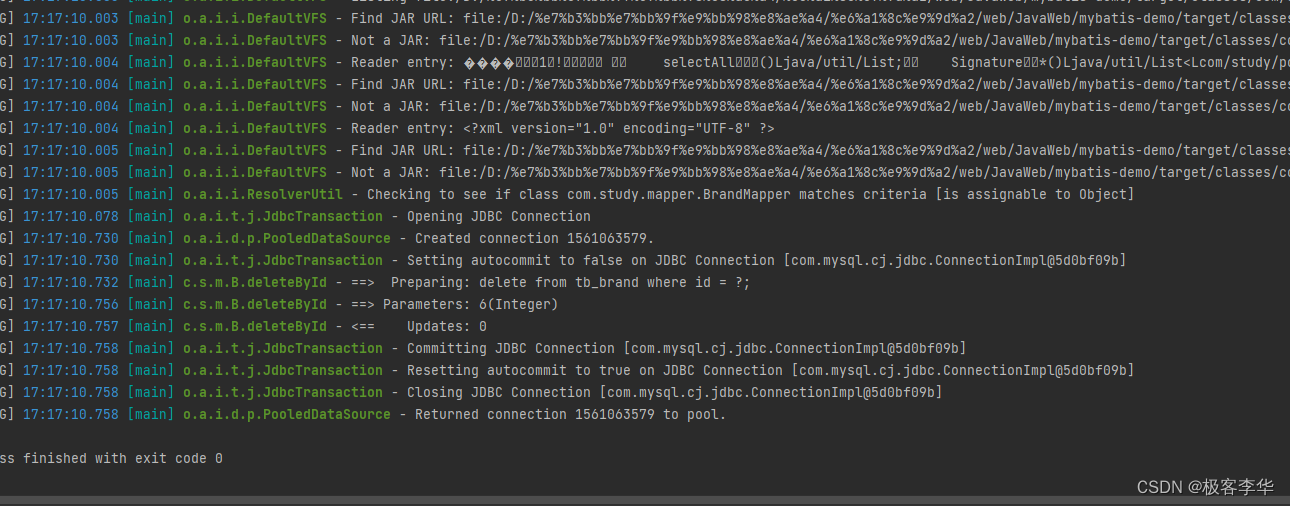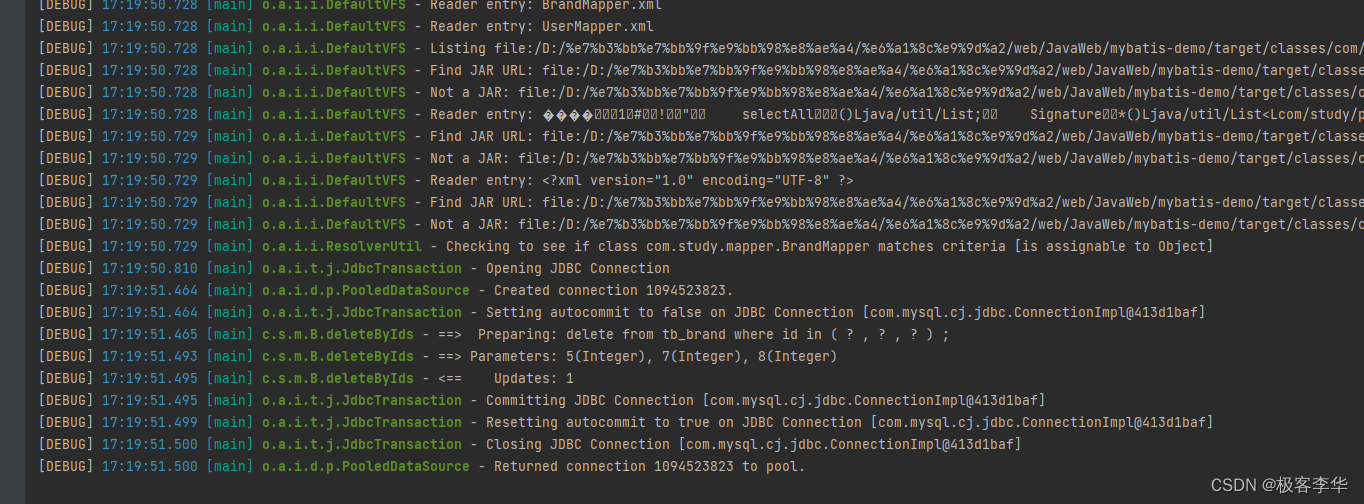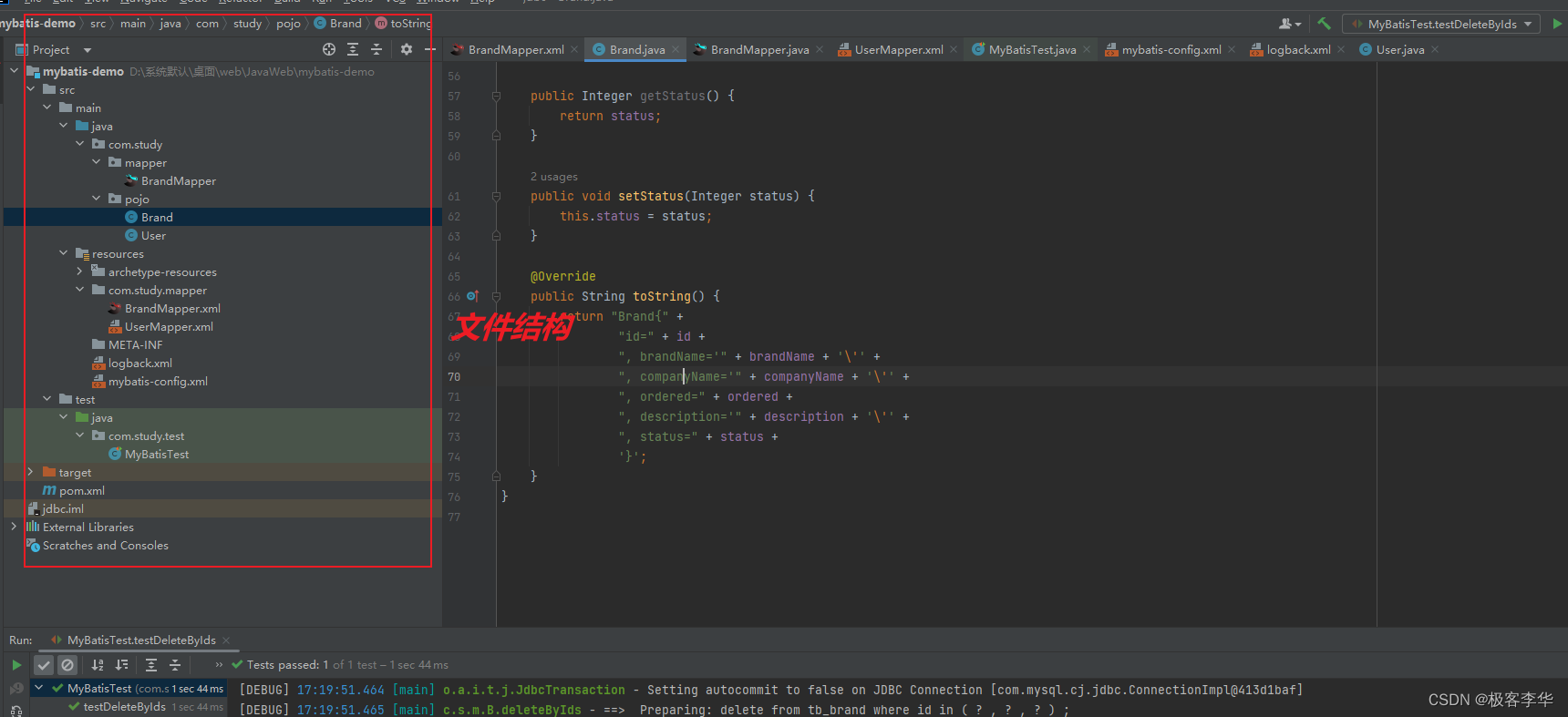Mybatis练习(增加,删除,修改)
Mybatis练习(增加,删除,修改)

Mybatis练习(增加,删除,修改)
添加数据
编写接口方法
在 BrandMapper 接口中定义添加方法。
/**
* 添加
*/
void add(Brand brand);编写SQL语句
在 BrandMapper.xml 映射配置文件中编写添加数据的 statement
<insert id="add">
insert into tb_brand (brand_name, company_name, ordered, description, status)
values (#{brandName}, #{companyName}, #{ordered}, #{description}, #{status});
</insert>编写测试方法
在 test/java 下的 com.study.mapper 包下的 MybatisTest类中 定义测试方法

@Test
public void testAdd() throws IOException {
//接收参数
int status = 1;
String companyName = "波导手机";
String brandName = "波导";
String description = "手机中的战斗机";
int ordered = 100;
//封装对象
Brand brand = new Brand();
brand.setStatus(status);
brand.setCompanyName(companyName);
brand.setBrandName(brandName);
brand.setDescription(description);
brand.setOrdered(ordered);
//1. 获取SqlSessionFactory
String resource = "mybatis-config.xml";
InputStream inputStream = Resources.getResourceAsStream(resource);
SqlSessionFactory sqlSessionFactory = new SqlSessionFactoryBuilder().build(inputStream);
//2. 获取SqlSession对象
SqlSession sqlSession = sqlSessionFactory.openSession();
//SqlSession sqlSession = sqlSessionFactory.openSession(true); //设置自动提交事务,这种情况不需要手动提交事务了
//3. 获取Mapper接口的代理对象
BrandMapper brandMapper = sqlSession.getMapper(BrandMapper.class);
//4. 执行方法
brandMapper.add(brand);
//提交事务
sqlSession.commit();
//5. 释放资源
sqlSession.close();
}执行结果如下

修改
编写接口方法
在 BrandMapper 接口中定义修改方法。
/**
* 修改
*/
void update(Brand brand);上述方法参数 Brand 就是封装了需要修改的数据,而id肯定是有数据的,这也是和添加方法的区别。
编写SQL语句
在 BrandMapper.xml 映射配置文件中编写修改数据的 statement。
<update id="update">
update tb_brand
<set>
<if test="brandName != null and brandName != ''">
brand_name = #{brandName},
</if>
<if test="companyName != null and companyName != ''">
company_name = #{companyName},
</if>
<if test="ordered != null">
ordered = #{ordered},
</if>
<if test="description != null and description != ''">
description = #{description},
</if>
<if test="status != null">
status = #{status}
</if>
</set>
where id = #{id};
</update>set 标签可以用于动态包含需要更新的列,忽略其它不更新的列。
编写测试方法
在 test/java 下的 com.study.mapper 包下的 MybatisTest类中 定义测试方法
@Test
public void testUpdate() throws IOException {
//接收参数
int status = 0;
String companyName = "波导手机";
String brandName = "波导";
String description = "波导手机,手机中的战斗机";
int ordered = 200;
int id = 5;
//封装对象
Brand brand = new Brand();
brand.setStatus(status);
brand.setCompanyName(companyName);
brand.setBrandName(brandName);
brand.setDescription(description);
brand.setOrdered(ordered);
brand.setId(id);
//1. 获取SqlSessionFactory
String resource = "mybatis-config.xml";
InputStream inputStream = Resources.getResourceAsStream(resource);
SqlSessionFactory sqlSessionFactory = new SqlSessionFactoryBuilder().build(inputStream);
//2. 获取SqlSession对象
SqlSession sqlSession = sqlSessionFactory.openSession();
//SqlSession sqlSession = sqlSessionFactory.openSession(true);
//3. 获取Mapper接口的代理对象
BrandMapper brandMapper = sqlSession.getMapper(BrandMapper.class);
//4. 执行方法
int count = brandMapper.update(brand);
System.out.println(count);
//提交事务
sqlSession.commit();
//5. 释放资源
sqlSession.close();
}运行结果

从结果中SQL语句可以看出,只修改了 status 字段值,因为我们给的数据中只给Brand实体对象的 status 属性设置值了。这就是 set 标签的作用。
删除一行数据
如上图所示,每行数据后面都有一个 删除 按钮,当用户点击了该按钮,就会将改行数据删除掉。那我们就需要思考,这种删除是根据什么进行删除呢?是通过主键id删除,因为id是表中数据的唯一标识。
接下来就来实现该功能。
编写接口方法
在 BrandMapper 接口中定义根据id删除方法。
/**
* 根据id删除
*/
void deleteById(int id);编写SQL语句
在 BrandMapper.xml 映射配置文件中编写删除一行数据的 statement
<delete id="deleteById">
delete from tb_brand where id = #{id};
</delete>编写测试方法
在 test/java 下的 com.study.mapper 包下的 MybatisTest类中 定义测试方法
@Test
public void testDeleteById() throws IOException {
//接收参数
int id = 6;
//1. 获取SqlSessionFactory
String resource = "mybatis-config.xml";
InputStream inputStream = Resources.getResourceAsStream(resource);
SqlSessionFactory sqlSessionFactory = new SqlSessionFactoryBuilder().build(inputStream);
//2. 获取SqlSession对象
SqlSession sqlSession = sqlSessionFactory.openSession();
//SqlSession sqlSession = sqlSessionFactory.openSession(true);
//3. 获取Mapper接口的代理对象
BrandMapper brandMapper = sqlSession.getMapper(BrandMapper.class);
//4. 执行方法
brandMapper.deleteById(id);
//提交事务
sqlSession.commit();
//5. 释放资源
sqlSession.close();
}运行结果

批量删除
如上图所示,用户可以选择多条数据,然后点击上面的 删除 按钮,就会删除数据库中对应的多行数据。
编写接口方法
在 BrandMapper 接口中定义删除多行数据的方法。
/**
* 批量删除
*/
void deleteByIds(int[] ids);参数是一个数组,数组中存储的是多条数据的id
编写SQL语句
在 BrandMapper.xml 映射配置文件中编写删除多条数据的 statement。
编写SQL时需要遍历数组来拼接SQL语句。Mybatis 提供了 foreach 标签供我们使用
foreach 标签
用来迭代任何可迭代的对象(如数组,集合)。
- collection 属性:
- mybatis会将数组参数,封装为一个Map集合。
- 默认:array = 数组
- 使用@Param注解改变map集合的默认key的名称
- mybatis会将数组参数,封装为一个Map集合。
- item 属性:本次迭代获取到的元素。
- separator 属性:集合项迭代之间的分隔符。
foreach标签不会错误地添加多余的分隔符。也就是最后一次迭代不会加分隔符。 - open 属性:该属性值是在拼接SQL语句之前拼接的语句,只会拼接一次
- close 属性:该属性值是在拼接SQL语句拼接后拼接的语句,只会拼接一次
<delete id="deleteByIds">
delete from tb_brand where id
in
<foreach collection="array" item="id" separator="," open="(" close=")">
#{id}
</foreach>
;
</delete>假如数组中的id数据是{1,2,3},那么拼接后的sql语句就是:
delete from tb_brand where id in (1,2,3);编写测试方法
在 test/java 下的 com.study.mapper 包下的 MybatisTest类中 定义测试方法
@Test
public void testDeleteByIds() throws IOException {
//接收参数
int[] ids = {5,7,8};
//1. 获取SqlSessionFactory
String resource = "mybatis-config.xml";
InputStream inputStream = Resources.getResourceAsStream(resource);
SqlSessionFactory sqlSessionFactory = new SqlSessionFactoryBuilder().build(inputStream);
//2. 获取SqlSession对象
SqlSession sqlSession = sqlSessionFactory.openSession();
//SqlSession sqlSession = sqlSessionFactory.openSession(true);
//3. 获取Mapper接口的代理对象
BrandMapper brandMapper = sqlSession.getMapper(BrandMapper.class);
//4. 执行方法
brandMapper.deleteByIds(ids);
//提交事务
sqlSession.commit();
//5. 释放资源
sqlSession.close();
}运行结果

注解实现CRUD
使用注解开发会比配置文件开发更加方便。如下就是使用注解进行开发
@Select(value = "select * from tb_user where id = #{id}")
public User select(int id);注意:
- 注解是用来替换映射配置文件方式配置的,所以使用了注解,就不需要再映射配置文件中书写对应的
statement
Mybatis 针对 CURD 操作都提供了对应的注解,已经做到见名知意。如下:
- 查询 :@Select
- 添加 :@Insert
- 修改 :@Update
- 删除 :@Delete
文件汇总

BrandMapper.class
package com.study.mapper;
import com.study.pojo.Brand;
import org.apache.ibatis.annotations.Param;
import java.util.List;
import java.util.Map;
public interface BrandMapper {
/**
* 查询所有
*/
List<Brand> selectAll();
/**
* 查看详情:根据Id查询
*/
Brand selectById(int id);
List<Brand> selectByCondition(@Param("status") int status, @Param("companyName") String companyName, @Param("brandName") String brandName);
List<Brand> selectByCondition(Map map);
/**
* 单条件动态查询
* @param brand
* @return
*/
List<Brand> selectByConditionSingle(Brand brand);
/**
* 添加
*/
void add(Brand brand);
/**
* 修改
*/
int update(Brand brand);
/**
* 根据id删除
*/
void deleteById(int id);
/**
* 批量删除
*/
void deleteByIds(int[] ids);
}BrandMapper.xml
<?xml version="1.0" encoding="UTF-8" ?>
<!DOCTYPE mapper
PUBLIC "-//mybatis.org//DTD Mapper 3.0//EN"
"http://mybatis.org/dtd/mybatis-3-mapper.dtd">
<mapper namespace="com.study.mapper.BrandMapper">
<resultMap id="brandResultMap" type="brand">
<!--
id:完成主键字段的映射
column:表的列名
property:实体类的属性名
result:完成一般字段的映射
column:表的列名
property:实体类的属性名
使用resutlMap的目的在于Brand中的成员与数据库中的成员的命名方式
不一样
这种不同会导致这样的问题封装对象的时候出现问题,导致名字不同的对象无法查询出来
-->
<result column="brand_name" property="brandName"/>
<result column="company_name" property="companyName"/>
</resultMap>
<select id="selectAll" resultMap="brandResultMap">
select *
from tb_brand;
</select>
<select id="selectById" resultMap="brandResultMap">
select *
from tb_brand where id <![CDATA[
<
]]> #{id};
</select>
<select id="selectByCondition" resultMap="brandResultMap">
select *
from tb_brand
where status = #{status}
and company_name like #{companyName}
and brand_name like #{brandName}
</select>
<select id="selectByConditionSingle" resultMap="brandResultMap">
select *
from tb_brand
<where>
<choose><!--相当于switch-->
<when test="status != null"><!--相当于case-->
status = #{status}
</when>
<when test="companyName != null and companyName != '' "><!--相当于case-->
company_name like #{companyName}
</when>
<when test="brandName != null and brandName != ''"><!--相当于case-->
brand_name like #{brandName}
</when>
</choose>
</where>
</select>
<insert id="add">
insert into tb_brand (brand_name, company_name, ordered, description, status)
values (#{brandName}, #{companyName}, #{ordered}, #{description}, #{status});
</insert>
<update id="update">
update tb_brand
<set>
<if test="brandName != null and brandName != ''">
brand_name = #{brandName},
</if>
<if test="companyName != null and companyName != ''">
company_name = #{companyName},
</if>
<if test="ordered != null">
ordered = #{ordered},
</if>
<if test="description != null and description != ''">
description = #{description},
</if>
<if test="status != null">
status = #{status}
</if>
</set>
where id = #{id};
</update>
<delete id="deleteById">
delete from tb_brand where id = #{id};
</delete>
<delete id="deleteByIds">
delete from tb_brand where id
in
<foreach collection="array" item="id" separator="," open="(" close=")">
#{id}
</foreach>
;
</delete>
</mapper>MyBatisTest
package com.study.test;
import com.study.mapper.BrandMapper;
import com.study.pojo.Brand;
import org.apache.ibatis.io.Resources;
import org.apache.ibatis.session.SqlSession;
import org.apache.ibatis.session.SqlSessionFactory;
import org.apache.ibatis.session.SqlSessionFactoryBuilder;
import org.junit.Test;
import java.io.IOException;
import java.io.InputStream;
import java.util.HashMap;
import java.util.List;
import java.util.Map;
public class MyBatisTest {
@Test
public void testSelectAll() throws IOException {
//1. 获取SqlSessionFactory
String resource = "mybatis-config.xml";
InputStream inputStream = Resources.getResourceAsStream(resource);
SqlSessionFactory sqlSessionFactory = new SqlSessionFactoryBuilder().build(inputStream);
//2. 获取SqlSession对象
SqlSession sqlSession = sqlSessionFactory.openSession();
//3. 获取Mapper接口的代理对象
BrandMapper brandMapper = sqlSession.getMapper(BrandMapper.class);
//4. 执行方法
List<Brand> brands = brandMapper.selectAll();
System.out.println(brands);
//5. 释放资源
sqlSession.close();
}
@Test
public void testSelectById() throws IOException {
//接收参数,该id以后需要传递过来
int id = 1;
//1. 获取SqlSessionFactory
String resource = "mybatis-config.xml";
InputStream inputStream = Resources.getResourceAsStream(resource);
SqlSessionFactory sqlSessionFactory = new SqlSessionFactoryBuilder().build(inputStream);
//2. 获取SqlSession对象
SqlSession sqlSession = sqlSessionFactory.openSession();
//3. 获取Mapper接口的代理对象
BrandMapper brandMapper = sqlSession.getMapper(BrandMapper.class);
//4. 执行方法
Brand brand = brandMapper.selectById(id);
System.out.println(brand);
//5. 释放资源
sqlSession.close();
}
@Test
public void testSelectByCondition() throws IOException {
//接收参数
int status = 1;
String companyName = "华为";
String brandName = "华为";
// 处理参数
companyName = "%" + companyName + "%";
brandName = "%" + brandName + "%";
//1. 获取SqlSessionFactory
String resource = "mybatis-config.xml";
InputStream inputStream = Resources.getResourceAsStream(resource);
SqlSessionFactory sqlSessionFactory = new SqlSessionFactoryBuilder().build(inputStream);
//2. 获取SqlSession对象
SqlSession sqlSession = sqlSessionFactory.openSession();
//3. 获取Mapper接口的代理对象
BrandMapper brandMapper = sqlSession.getMapper(BrandMapper.class);
//4. 执行方法
//方式一 :接口方法参数使用 @Param 方式调用的方法
//List<Brand> brands = brandMapper.selectByCondition(status, companyName, brandName);
//方式二 :接口方法参数是 实体类对象 方式调用的方法
//封装对象
/* Brand brand = new Brand();
brand.setStatus(status);
brand.setCompanyName(companyName);
brand.setBrandName(brandName);*/
//List<Brand> brands = brandMapper.selectByCondition(brand);
//方式三 :接口方法参数是 map集合对象 方式调用的方法
Map map = new HashMap();
map.put("status" , status);
map.put("companyName", companyName);
map.put("brandName" , brandName);
List<Brand> brands = brandMapper.selectByCondition(map);
System.out.println(brands);
//5. 释放资源
sqlSession.close();
}
@Test
public void testSelectByConditionSingle() throws IOException {
//接收参数
int status = 1;
String companyName = "华为";
String brandName = "华为";
// 处理参数
companyName = "%" + companyName + "%";
brandName = "%" + brandName + "%";
//封装对象
Brand brand = new Brand();
//brand.setStatus(status);
brand.setCompanyName(companyName);
//brand.setBrandName(brandName);
//1. 获取SqlSessionFactory
String resource = "mybatis-config.xml";
InputStream inputStream = Resources.getResourceAsStream(resource);
SqlSessionFactory sqlSessionFactory = new SqlSessionFactoryBuilder().build(inputStream);
//2. 获取SqlSession对象
SqlSession sqlSession = sqlSessionFactory.openSession();
//3. 获取Mapper接口的代理对象
BrandMapper brandMapper = sqlSession.getMapper(BrandMapper.class);
//4. 执行方法
List<Brand> brands = brandMapper.selectByConditionSingle(brand);
System.out.println(brands);
//5. 释放资源
sqlSession.close();
}
@Test
public void testAdd() throws IOException {
//接收参数
int status = 1;
String companyName = "波导手机";
String brandName = "波导";
String description = "手机中的战斗机";
int ordered = 100;
//封装对象
Brand brand = new Brand();
brand.setStatus(status);
brand.setCompanyName(companyName);
brand.setBrandName(brandName);
brand.setDescription(description);
brand.setOrdered(ordered);
//1. 获取SqlSessionFactory
String resource = "mybatis-config.xml";
InputStream inputStream = Resources.getResourceAsStream(resource);
SqlSessionFactory sqlSessionFactory = new SqlSessionFactoryBuilder().build(inputStream);
//2. 获取SqlSession对象
SqlSession sqlSession = sqlSessionFactory.openSession();
//SqlSession sqlSession = sqlSessionFactory.openSession(true); //设置自动提交事务,这种情况不需要手动提交事务了
//3. 获取Mapper接口的代理对象
BrandMapper brandMapper = sqlSession.getMapper(BrandMapper.class);
//4. 执行方法
brandMapper.add(brand);
//提交事务
sqlSession.commit();
//5. 释放资源
sqlSession.close();
}
@Test
public void testUpdate() throws IOException {
//接收参数
int status = 0;
String companyName = "波导手机";
String brandName = "波导";
String description = "波导手机,手机中的战斗机";
int ordered = 200;
int id = 5;
//封装对象
Brand brand = new Brand();
brand.setStatus(status);
brand.setCompanyName(companyName);
brand.setBrandName(brandName);
brand.setDescription(description);
brand.setOrdered(ordered);
brand.setId(id);
//1. 获取SqlSessionFactory
String resource = "mybatis-config.xml";
InputStream inputStream = Resources.getResourceAsStream(resource);
SqlSessionFactory sqlSessionFactory = new SqlSessionFactoryBuilder().build(inputStream);
//2. 获取SqlSession对象
SqlSession sqlSession = sqlSessionFactory.openSession();
//SqlSession sqlSession = sqlSessionFactory.openSession(true);
//3. 获取Mapper接口的代理对象
BrandMapper brandMapper = sqlSession.getMapper(BrandMapper.class);
//4. 执行方法
int count = brandMapper.update(brand);
System.out.println(count);
//提交事务
sqlSession.commit();
//5. 释放资源
sqlSession.close();
}
@Test
public void testDeleteById() throws IOException {
//接收参数
int id = 6;
//1. 获取SqlSessionFactory
String resource = "mybatis-config.xml";
InputStream inputStream = Resources.getResourceAsStream(resource);
SqlSessionFactory sqlSessionFactory = new SqlSessionFactoryBuilder().build(inputStream);
//2. 获取SqlSession对象
SqlSession sqlSession = sqlSessionFactory.openSession();
//SqlSession sqlSession = sqlSessionFactory.openSession(true);
//3. 获取Mapper接口的代理对象
BrandMapper brandMapper = sqlSession.getMapper(BrandMapper.class);
//4. 执行方法
brandMapper.deleteById(id);
//提交事务
sqlSession.commit();
//5. 释放资源
sqlSession.close();
}
@Test
public void testDeleteByIds() throws IOException {
//接收参数
int[] ids = {5,7,8};
//1. 获取SqlSessionFactory
String resource = "mybatis-config.xml";
InputStream inputStream = Resources.getResourceAsStream(resource);
SqlSessionFactory sqlSessionFactory = new SqlSessionFactoryBuilder().build(inputStream);
//2. 获取SqlSession对象
SqlSession sqlSession = sqlSessionFactory.openSession();
//SqlSession sqlSession = sqlSessionFactory.openSession(true);
//3. 获取Mapper接口的代理对象
BrandMapper brandMapper = sqlSession.getMapper(BrandMapper.class);
//4. 执行方法
brandMapper.deleteByIds(ids);
//提交事务
sqlSession.commit();
//5. 释放资源
sqlSession.close();
}
}mybatis-config.xml
<?xml version="1.0" encoding="UTF-8" ?>
<!DOCTYPE configuration
PUBLIC "-//mybatis.org//DTD Config 3.0//EN"
"http://mybatis.org/dtd/mybatis-3-config.dtd">
<configuration>
<typeAliases>
<package name="com.study.pojo"/>
</typeAliases>
<!--
environments:配置数据库连接环境信息。可以配置多个environment,通过default属性切换不同的environment
-->
<environments default="database1">
<!-- 这里需要注意的是 environments标签中可以存在多个environment
代表多个数据库环境,然后default就是一个默认值,我这里把默认值设置成了
第一个数据库database1
-->
<environment id="database1">
<transactionManager type="JDBC"/>
<dataSource type="POOLED">
<!--数据库连接信息-->
<property name="driver" value="com.mysql.cj.jdbc.Driver"/>
<property name="url" value="jdbc:mysql://localhost:3306/db?serverTimezone=GMT%2B8&useOldAliasMetadataBehavior=true"/>
<property name="username" value="root"/>
<property name="password" value="12345"/>
</dataSource>
</environment>
</environments>
<mappers>
<!--加载sql映射文件-->
<!-- <mapper resource="UserMapper.xml"/>-->
<!--Mapper代理方式-->
<package name="com.study.mapper"/>
</mappers>
</configuration>logback.xml
<?xml version="1.0" encoding="UTF-8"?>
<configuration>
<!--
CONSOLE :表示当前的日志信息是可以输出到控制台的。
-->
<appender name="Console" class="ch.qos.logback.core.ConsoleAppender">
<encoder>
<pattern>[%level] %blue(%d{HH:mm:ss.SSS}) %cyan([%thread]) %boldGreen(%logger{15}) - %msg %n</pattern>
</encoder>
</appender>
<logger name="com.itheima" level="DEBUG" additivity="false">
<appender-ref ref="Console"/>
</logger>
<!--
level:用来设置打印级别,大小写无关:TRACE, DEBUG, INFO, WARN, ERROR, ALL 和 OFF
, 默认debug
<root>可以包含零个或多个<appender-ref>元素,标识这个输出位置将会被本日志级别控制。
-->
<root level="DEBUG">
<appender-ref ref="Console"/>
</root>
</configuration>Brand
package com.study.pojo;
public class Brand {
// id 主键
private Integer id;
// 品牌名称
private String brandName;
// 企业名称
private String companyName;
// 排序字段
private Integer ordered;
// 描述信息
private String description;
// 状态:0:禁用 1:启用
private Integer status;
public Integer getId() {
return id;
}
public void setId(Integer id) {
this.id = id;
}
public String getBrandName() {
return brandName;
}
public void setBrandName(String brandName) {
this.brandName = brandName;
}
public String getCompanyName() {
return companyName;
}
public void setCompanyName(String companyName) {
this.companyName = companyName;
}
public Integer getOrdered() {
return ordered;
}
public void setOrdered(Integer ordered) {
this.ordered = ordered;
}
public String getDescription() {
return description;
}
public void setDescription(String description) {
this.description = description;
}
public Integer getStatus() {
return status;
}
public void setStatus(Integer status) {
this.status = status;
}
@Override
public String toString() {
return "Brand{" +
"id=" + id +
", brandName='" + brandName + '\'' +
", companyName='" + companyName + '\'' +
", ordered=" + ordered +
", description='" + description + '\'' +
", status=" + status +
'}';
}
}
